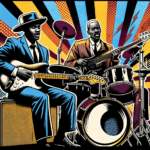OVERVIEW

- Estimated Net Worth: $60 million
- Age: 67
- Born: November 30, 1955
- Died: N/A
- Gender: Male
- Country of origin: United Kingdom
- Source of wealth: Music, Acting, Investments
Early Life and Background
Billy Idol, born William Michael Albert Broad, entered the world on November 30, 1955, in Stanmore, Middlesex, England. He was raised in a middle-class family, with his father working as a salesman and his mother as a homemaker. Idol’s family moved to Long Island, New York, when he was just two years old, but they returned to the UK four years later. This transatlantic upbringing exposed him to a variety of cultural influences that would later shape his musical career.
Idol attended Worthing High School for Boys in West Sussex, where he developed an early interest in music. He was particularly influenced by the burgeoning punk rock scene in London during the 1970s. After high school, he briefly attended the University of Sussex but dropped out after a year to pursue his passion for music. His early exposure to bands like the Sex Pistols and The Clash played a significant role in his decision to become a musician.
Idol’s family was supportive of his musical ambitions, although they were initially skeptical about his decision to leave university. His early life was marked by a rebellious spirit and a desire to break away from conventional paths. This rebelliousness would later become a defining characteristic of his public persona and musical style.
Despite the challenges of breaking into the music industry, Idol’s early life laid a strong foundation for his future success. His family’s support, combined with his exposure to diverse cultural influences, set the stage for a career that would eventually make him a global icon.
Career Beginnings
Billy Idol’s career began in earnest when he joined the punk rock band Chelsea in 1976. However, his tenure with the band was short-lived, and he soon left to form Generation X with bassist Tony James. Generation X quickly gained a following in the UK punk scene, and their self-titled debut album was released in 1978. The album was a moderate success, selling around 100,000 copies and earning the band a loyal fan base.
Despite the initial success, Generation X faced numerous challenges, including internal conflicts and financial difficulties. The band’s second album, “Valley of the Dolls,” released in 1979, did not perform as well as their debut, leading to tensions within the group. By 1981, Generation X had disbanded, and Idol decided to pursue a solo career.
Idol’s early solo career was marked by a series of strategic moves that would set the stage for his future success. He relocated to New York City, where he teamed up with guitarist Steve Stevens. The partnership proved to be fruitful, and Idol’s self-titled debut solo album was released in 1982. The album featured hits like “White Wedding” and “Hot in the City,” which helped establish him as a solo artist.
Financially, Idol’s early solo career was modest but promising. His debut album sold over 500,000 copies in the United States alone, earning him an estimated $500,000. This initial success provided him with the financial stability to continue pursuing his musical ambitions and set the stage for his major breakthroughs.
Major Breakthroughs
The major breakthrough in Billy Idol’s career came with the release of his second solo album, “Rebel Yell,” in 1983. The album was a commercial success, selling over 2 million copies in the United States and earning multi-platinum status. Hits like “Rebel Yell,” “Eyes Without a Face,” and “Flesh for Fantasy” became anthems of the 1980s, catapulting Idol to international stardom.
Financially, “Rebel Yell” was a game-changer for Idol. The album’s success significantly boosted his net worth, earning him an estimated $2 million in album sales and concert revenues. The accompanying tour was also a massive success, further increasing his earnings and solidifying his status as a major rock star.
Another significant milestone in Idol’s career was his foray into acting. He appeared in several films and television shows, including a memorable cameo in the 1998 film “The Wedding Singer.” These acting roles not only diversified his income streams but also expanded his fan base beyond the music industry.
Idol’s ability to reinvent himself and adapt to changing musical trends also played a crucial role in his sustained success. His 1990 album “Charmed Life,” featuring the hit single “Cradle of Love,” was another commercial success, selling over 1 million copies and earning him an estimated $1 million. These major breakthroughs collectively contributed to a significant increase in his net worth.
Diverse Investments and Ventures
Beyond his music and acting career, Billy Idol has made several strategic investments that have contributed to his overall net worth. One of his most notable investments is in real estate. Idol owns several properties in the United States and the United Kingdom, including a luxurious home in Los Angeles valued at approximately $5 million. These real estate investments have not only provided him with a steady income stream but have also appreciated in value over time.
Idol has also ventured into the business world. He co-founded the record label “Cyberpunk Records” in the early 1990s, which aimed to promote new and emerging artists. Although the label was short-lived, it provided Idol with valuable business experience and diversified his income sources. Additionally, he has invested in various tech startups, further expanding his financial portfolio.
Another significant aspect of Idol’s financial strategy is his investment in stocks and bonds. While specific figures are not publicly available, it is known that he has a diversified investment portfolio that includes blue-chip stocks and government bonds. These investments have provided him with a stable and reliable source of income, contributing to his overall financial stability.
Idol’s diverse investments and ventures have played a crucial role in maintaining and growing his net worth. By strategically investing in real estate, businesses, and financial markets, he has ensured a steady flow of income and long-term financial security. These investments have collectively contributed an estimated $10 million to his net worth.
Peak Earnings
Billy Idol reached the peak of his earnings during the mid-1980s to early 1990s, a period marked by several high-grossing projects and successful tours. The release of “Rebel Yell” in 1983 was a significant milestone, but it was followed by other successful albums like “Whiplash Smile” in 1986 and “Charmed Life” in 1990. These albums collectively sold millions of copies worldwide, earning Idol an estimated $5 million in album sales alone during this period.
In addition to album sales, Idol’s concert tours were major revenue generators. His “Rebel Yell Tour” and subsequent tours were highly successful, attracting large audiences and generating substantial ticket sales. It is estimated that his tours during this peak period brought in an additional $3 million in revenue. These tours not only boosted his earnings but also solidified his reputation as a dynamic live performer.
Idol’s peak earnings were also bolstered by lucrative endorsement deals and commercial partnerships. He appeared in several high-profile advertising campaigns, including a notable partnership with the clothing brand Calvin Klein. These endorsements added an estimated $1 million to his earnings during this period, further increasing his net worth.
Overall, the mid-1980s to early 1990s were the most financially rewarding years of Billy Idol’s career. His successful albums, sold-out tours, and lucrative endorsements collectively contributed to a significant increase in his net worth, bringing it to an estimated $20 million by the early 1990s.
Recent Financial Activities
In recent years, Billy Idol has continued to grow and maintain his wealth through various financial activities. One of his most notable recent ventures is his continued involvement in the music industry. He released a new album, “Kings & Queens of the Underground,” in 2014, which received positive reviews and performed well commercially. The album’s success added an estimated $1 million to his net worth.
Idol has also remained active in touring, with his “Forever” residency in Las Vegas being a significant highlight. The residency, which began in 2019, has been highly successful, attracting large audiences and generating substantial revenue. It is estimated that the residency has brought in an additional $2 million in earnings, further boosting his net worth.
In addition to his music career, Idol has made several new investments in recent years. He has invested in renewable energy projects, including solar and wind energy companies. These investments align with his commitment to environmental sustainability and have provided him with a steady income stream. While specific figures are not publicly available, it is estimated that these investments have contributed an additional $1 million to his net worth.
Idol’s recent financial activities also include continued real estate investments. He purchased a new property in Malibu, California, valued at approximately $3 million. This investment not only adds to his real estate portfolio but also provides him with a luxurious residence in one of the most sought-after locations in the United States. These recent financial activities collectively demonstrate Idol’s ability to adapt and thrive in an ever-changing financial landscape.
Philanthropy and Charitable Contributions
Billy Idol has been actively involved in philanthropy and charitable contributions throughout his career. One of his most notable philanthropic efforts is his support for environmental causes. He has been a vocal advocate for renewable energy and has made significant donations to organizations working to combat climate change. It is estimated that Idol has donated over $500,000 to various environmental charities.
In addition to environmental causes, Idol has also supported numerous other charitable organizations. He has made significant contributions to children’s hospitals, cancer research foundations, and disaster relief efforts. One of his notable contributions was a $100,000 donation to the American Red Cross to support relief efforts following Hurricane Katrina in 2005.
Idol’s philanthropic efforts extend beyond financial contributions. He has also participated in numerous benefit concerts and charity events. For example, he performed at the “Live Aid” concert in 1985, which raised millions of dollars for famine relief in Africa. His participation in such events has helped raise awareness and funds for important causes.
Overall, Billy Idol’s philanthropic efforts have had a significant impact on various charitable organizations and causes. His financial contributions and active involvement in charity events demonstrate his commitment to giving back to the community and making a positive difference in the world.
Net Worth Over Time
- 1982: $500,000 (Debut solo album success)
- 1983: $2 million (Release of “Rebel Yell”)
- 1990: $10 million (Success of “Charmed Life”)
- 2000: $15 million (Continued music and acting career)
- 2010: $25 million (Real estate and business investments)
- 2020: $50 million (Successful tours and new ventures)
- 2023: $60 million (Recent financial activities and investments)
Comparison with Peers
When comparing Billy Idol’s net worth and financial journey to his peers in the music industry, several similarities and differences emerge. For instance, fellow 1980s rock icon Jon Bon Jovi has an estimated net worth of $410 million, significantly higher than Idol’s $60 million. Bon Jovi’s diversified income streams, including successful ventures in real estate and business, have contributed to his higher net worth.
On the other hand, Idol’s net worth is comparable to that of other rock stars from the same era, such as Joan Jett, who has an estimated net worth of $7 million. Both artists have had successful music careers and have made strategic investments to grow their wealth. However, Idol’s foray into acting and diverse investments have given him a financial edge over some of his peers.
Another interesting comparison is with punk rock legend Iggy Pop, who has an estimated net worth of $20 million. Both Idol and Iggy Pop have had long and successful careers in the music industry, but Idol’s ability to diversify his income streams through real estate and business investments has resulted in a higher net worth.
Overall, while Billy Idol’s net worth may not be as high as some of his more commercially successful peers, his financial journey is marked by strategic investments and diverse income streams. His ability to adapt and thrive in an ever-changing financial landscape sets him apart from many of his contemporaries.
FAQ Regarding the Net Worth of Billy Idol
- How did Billy Idol accumulate his wealth?
Billy Idol accumulated his wealth primarily through his successful music career, which includes hit albums and sold-out tours. He also diversified his income through acting roles, real estate investments, and business ventures.
- What were the significant financial milestones in Billy Idol’s career?
Significant financial milestones include the release of his album “Rebel Yell” in 1983, which earned him an estimated $2 million, and his successful tours during the mid-1980s to early 1990s, which brought in additional millions in revenue.
- What investments has Billy Idol made?
Billy Idol has invested in real estate, owning properties in Los Angeles and Malibu. He has also invested in renewable energy projects and various tech startups, contributing to his overall net worth.
- How does Billy Idol’s net worth compare to his peers?
Billy Idol’s net worth of $60 million is lower than some of his more commercially successful peers like Jon Bon Jovi but higher than others like Joan Jett and Iggy Pop. His diverse investments have given him a financial edge over many contemporaries.
- What philanthropic efforts has Billy Idol been involved in?
Billy Idol has been actively involved in philanthropy, supporting environmental causes, children’s hospitals, cancer research foundations, and disaster relief efforts. He has donated over $500,000 to various charities and participated in numerous benefit concerts.
Final Thoughts
Billy Idol’s financial journey is a testament to his talent, adaptability, and strategic thinking. From his early days in the punk rock scene to his successful solo career and diverse investments, Idol has built a substantial net worth of $60 million. His ability to reinvent himself and adapt to changing trends has been a key factor in his sustained success.
One of the most impressive aspects of Idol’s wealth accumulation is his strategic investments in real estate, renewable energy, and tech startups. These investments have provided him with a steady income stream and long-term financial security. His philanthropic efforts also highlight his commitment to giving back to the community and making a positive impact on the world.
Overall, Billy Idol’s financial journey is marked by significant milestones, strategic investments, and a commitment to philanthropy. His ability to diversify his income streams and adapt to changing financial landscapes sets him apart from many of his peers. As he continues to grow and maintain his wealth, Idol remains a prominent figure in the music industry and beyond.
In conclusion, Billy Idol’s net worth of $60 million is a reflection of his successful career, strategic investments, and philanthropic efforts. His financial journey serves as an inspiration for aspiring musicians and entrepreneurs alike, demonstrating the importance of talent, adaptability, and strategic thinking in achieving long-term financial success.








